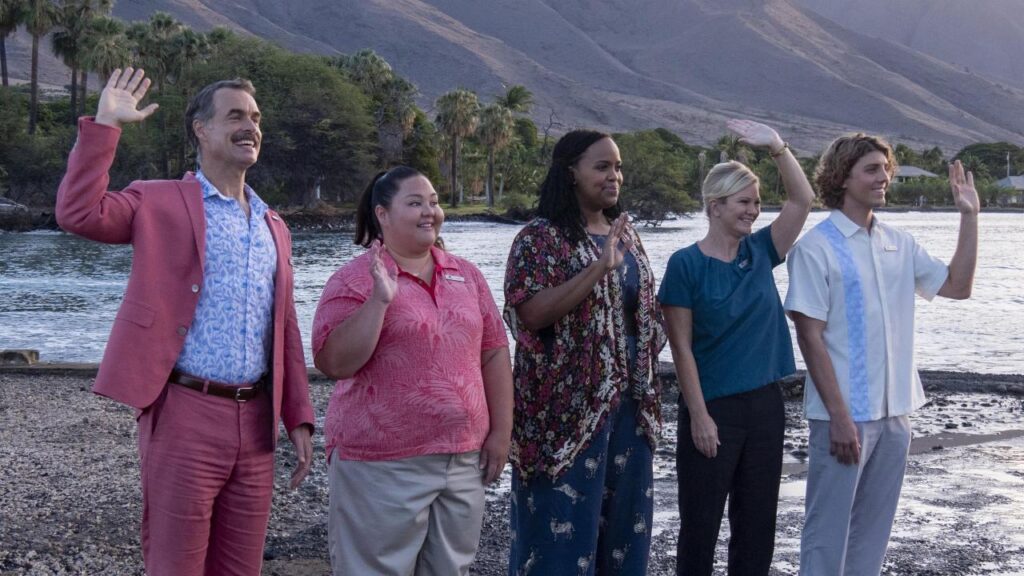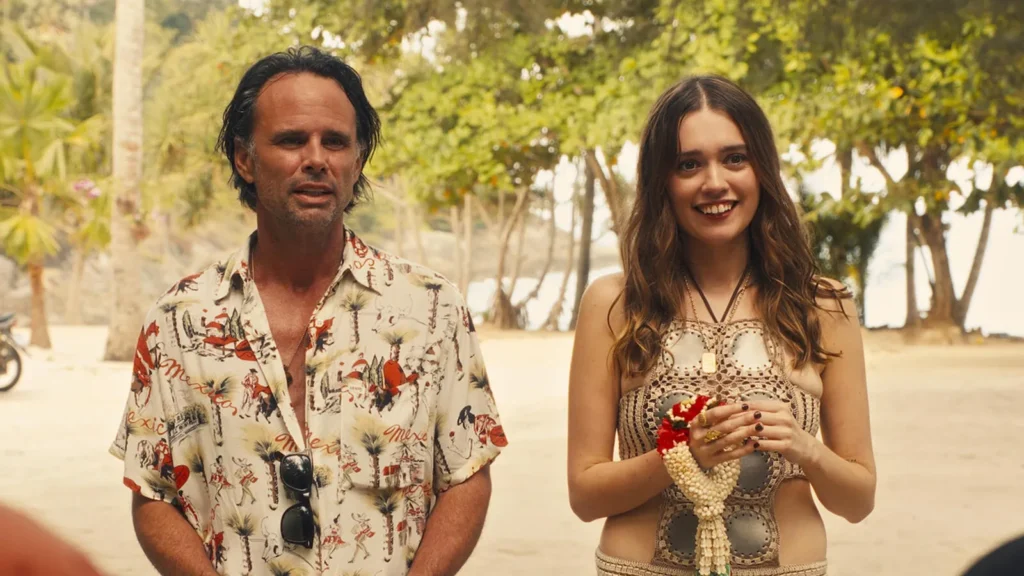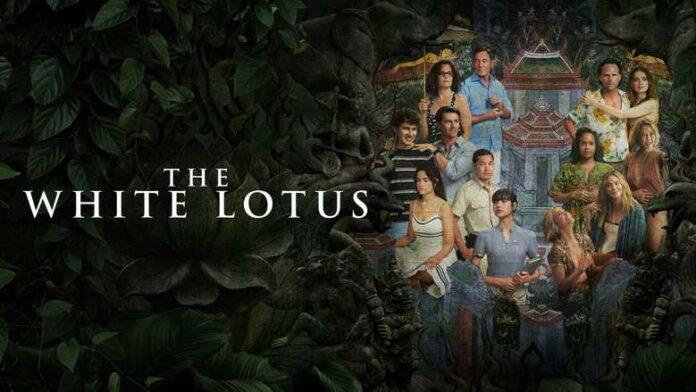By: Isuru Parakrama
April 13, World (LNW): Mike White’s acclaimed television series The White Lotus unfolds like a luxury holiday gone wrong, yet beneath its sun-soaked resorts and picture-perfect vistas lies an astute dissection of modern capitalism and the quietly simmering tensions between the elite and the rest.
With this article exploring the depths of such social phenomena, viewer discretion is advised – spoilers ahead!
With biting satire and razor-sharp dialogue, the show pulls back the curtain on the hypocrisies, self-delusions, and unchecked power of the wealthy, revealing not only how they live in a world immune to consequence, but how their hubris often leads to their moral – and sometimes literal – downfall.
Each season of The White Lotus is meticulously set in an opulent hotel, a microcosm where class hierarchies become grotesquely visible. The staff, though superficially polite, are all too aware of their position within the hierarchy, often quietly seething beneath the surface. The wealthy guests, meanwhile, remain blissfully detached from the reality they impose on others. It is not merely a critique of wealth, but of the culture that sustains it – a capitalism that grooms its beneficiaries to believe in their inherent superiority whilst turning a blind eye to the systems that crush everyone else.
There is a subtle, persistent grudge simmering between the elite and the middle class throughout the series. The middle class is either desperate to ascend into the elite circle or resentfully aware that they never truly will. Characters like Harper in Season 2 embody this tension – sharp, observant, and critical of her surroundings, yet ultimately drawn into the very lifestyle she critiques. It is a grim commentary on how capitalism does not only oppress, it seduces. The middle class clings to morality, but once proximity to power and money is introduced, values are tested, distorted, or abandoned altogether.
Perhaps the most chilling element of the series is how the characters’ vanity leads them to ruin. From Tanya’s delusional pursuit of affection and status, to Shane’s obsessive entitlement over a hotel room, their inflated self-worth blinds them to reality. The pursuit of self-importance – whether through relationships, money, or dominance – becomes their undoing. The White Lotus does not just portray these downfalls as individual flaws, but as symptomatic of a system that rewards narcissism and punishes humility. When characters fall, it is often not due to malicious forces, but because they are trapped within their own illusions of grandeur.

Tanya’s tragic end in Season 2 is the most glaring example of this. Seduced by the charm of European aristocrats and flattered into a false sense of belonging, she is ultimately manipulated and cornered, her wealth and naïveté exploited by those who see her only as a means to an end. Her final moments – absurd, panicked, and accidental – are not just a darkly comic twist, but a metaphor for how the elite can be consumed by the very world they think they control. Tanya dies not just because she is foolish, but because the system that raised her on vanity and isolation leaves her utterly defenceless when real danger arrives.
The show’s genius lies not only in its satire of the elite, but in the way it shows how systemic behaviours repeat across social strata. Belinda Lindsey, the spa manager in Season 1, is initially portrayed as a victim of Tanya’s erratic generosity – promised support and upliftment, only to be discarded when Tanya finds a new distraction. However, in a clever turn in the Thailand-based Season 3, Belinda is shown repeating the exact same behaviour towards a local hotel employee. She, too, dangles hope – a spa business idea, a chance at upward mobility – only to abandon it in pursuit of her own ambitions. What was once oppression becomes replication. The abused, now with marginal power, becomes the abuser. The show lays bare how capitalism does not merely harm from above – it teaches people to internalise its logic and reproduce it whenever they get the chance.
Racism, sexism, and homophobia simmer beneath the glossy surface, never addressed outright but always present, woven into the fabric of elite behaviour. Paula’s experience in Season 1 as a woman of colour amongst white guests is suffused with awkward silence, well-meaning microaggressions, and ultimately, betrayal. The guests’ liberal façades crumble under pressure, revealing how deep-seated biases remain alive even amongst the wealthy who claim to be progressive. In truth, their wealth insulates them from the real work of justice – why challenge a system that benefits you, even if it disadvantages everyone else?

Sexism, too, runs rampant. Women are either trophy wives, mistresses, or struggling for autonomy in a world designed by and for men. Even characters like Tanya, who wield wealth, are not truly free. They are entangled in emotional dependencies, illusions of romance, and the manipulation of men who see them as nothing more than bank accounts in heels. Sex is transactional; relationships are power games. The show does not ask whether liberation is possible in such a world – it suggests that, within the system as it stands, it is merely a fantasy.
Homophobia, particularly in the upper echelons, is handled with similar complexity. Characters present as tolerant, open-minded cosmopolitans, but when control is at stake, old prejudices rise to the surface. The duplicity of the elite – publicly progressive, privately prejudiced – is rendered in chilling clarity, particularly in the ways they exploit, marginalise, or fetishise LGBTQIA+ individuals for their amusement, convenience, or image.
Perhaps most damning of all is the series’ portrayal of how the rich view the law: as a suggestion, not a boundary. Whether it is covering up deaths, exploiting workers, or committing fraud, the consequences are either softened or wholly evaded. Money shields them, lawyers buffer them, and the system bends around them. In contrast, the less privileged suffer the full brunt of justice, or worse, are coerced into silence. In The White Lotus, justice is not blind – it is bought.
Ultimately, the show is a bleak, brilliant exploration of a society where morality is optional for those with wealth, and consequence is something that happens to other people. Behind the Instagram-perfect holidays, beneath the designer labels and infinity pools, lies a world rotting from the inside. The White Lotus does not just invite us to sneer at the rich – it forces us to reckon with how easily we could become them, and how willingly we might trade our integrity for comfort if given the chance.

Photos: The Internet

